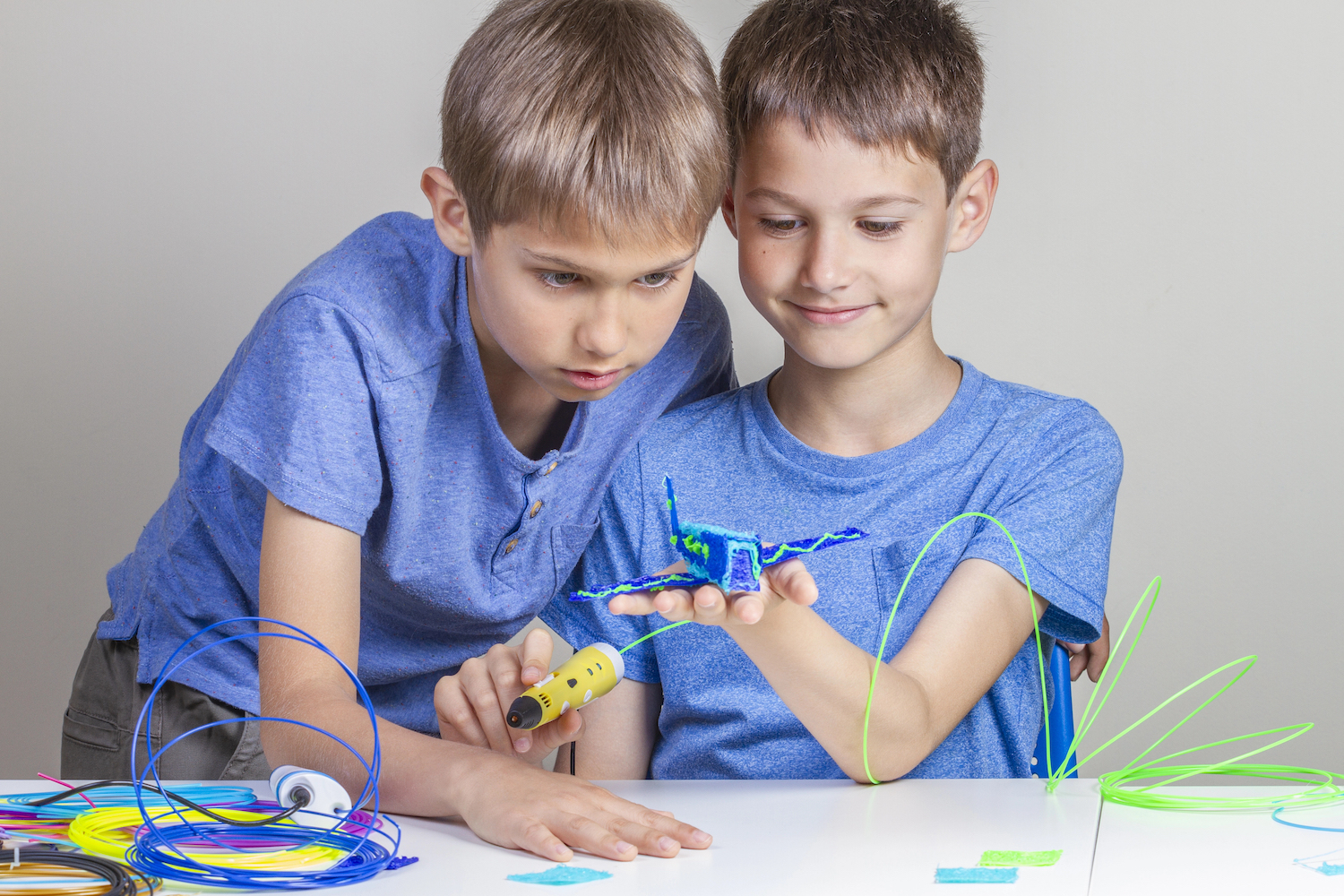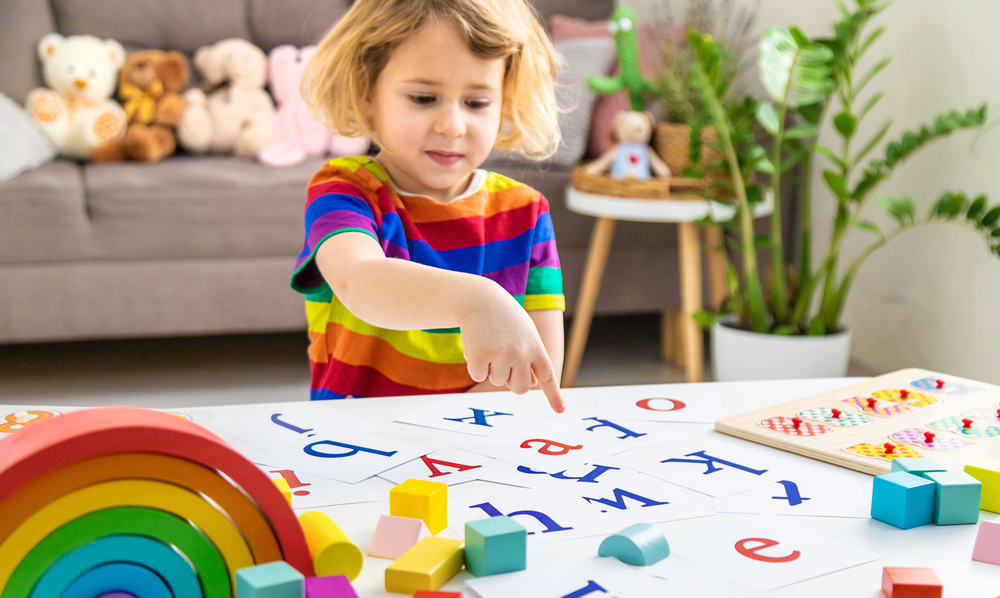As children grow, they’re constantly developing, learning, and gaining new skills. Activities at each stage of their lives play a vital role in shaping their emotional, cognitive, and physical development. By offering engaging, age-appropriate activities, you can help them become well-rounded adults, building the foundation for future success. This guide highlights key DIY activities for each stage, fostering essential skills that support growth.
Babies: Ages 0 to 12 Months
- Learning Activities: Introduce your baby to simple picture books with colorful images to teach basic shapes, colors, and objects. For example, show them a picture of a ball and say, “This is a red ball,” helping them associate words with visuals. As you count aloud with toys like stacking cups or blocks, your baby will begin to develop early number recognition and auditory skills. Repeating simple words and sounds while engaging with their toys or surroundings encourages language acquisition and cognitive development..
- Fine Motor: Encourage your baby to engage in activities like stacking lightweight objects (e.g., measuring cups or soft plastic rings) to strengthen hand-eye coordination and motor control. A large wooden puzzle with chunky pieces can provide your baby with a tactile experience while improving their ability to manipulate objects and problem-solve. You can also place their favorite toy just out of reach to encourage stretching and reaching, promoting physical growth and fine motor skills.
- Multisensory: Create a “shaker bottle” by filling a plastic bottle with dry rice, pasta, or beans. When your baby shakes it, they will explore sound, sight, and movement—all at once. Interactive toys with flashing lights, soft sounds, and varying textures help develop sensory awareness and build essential pathways in your baby’s developing brain. You can also introduce different textures by letting your baby touch items like soft fabrics, rubbery toys, or safe household objects to stimulate tactile learning and sensory integration.
- Sleep Coaching: Establish a consistent bedtime routine in a calm and quiet space. A great way to help your baby fall asleep is with a soothing music box or a mobile that plays gentle lullabies. Maintaining a routine where you feed, change, and put your baby to sleep at the same time each night will build security and help regulate their sleep patterns, contributing to better emotional and cognitive development.
- Entertainment: Engage your baby in simple activities like clapping your hands and singing cheerful songs. Show them new objects, like brightly colored toys or soft animal figures, and describe them to build their vocabulary and social awareness. Face-to-face interaction with family members—rather than passive activities like TV—supports bonding and teaches essential social cues, including facial expressions and body language
- Games: Peek-a-boo is a classic game that encourages the development of object permanence (the idea that objects still exist even when out of sight) while also fostering social interaction. You can also introduce large building blocks, soft-textured toys, and age-appropriate puzzles to promote cognitive development, problem-solving, and fine motor skills as your baby learns to manipulate the pieces. As they begin to explore and play, they develop both motor and cognitive abilities that lay the foundation for future learning.
- Indoor: Stimulate your baby’s mind with sensory-rich activities like tummy time, which strengthens muscles and promotes gross motor skills. Interactive books with textures, colors, or sounds can captivate your baby’s attention while boosting cognitive and sensory development. Crawling and exploring different textures or surfaces indoors encourages mobility and coordination, making the world around them feel engaging and fun.
- Outdoor: Take your baby for stroller walks to expose them to the world beyond their home. A walk through the park offers a variety of sensory experiences—from the sight of trees and animals to the sound of birds chirping or leaves rustling. These outdoor moments introduce new stimuli that promote auditory, visual, and emotional development while fostering curiosity about the environment. Fresh air and sunlight are crucial for healthy development, and being outdoors can help strengthen your baby’s immune system as well.
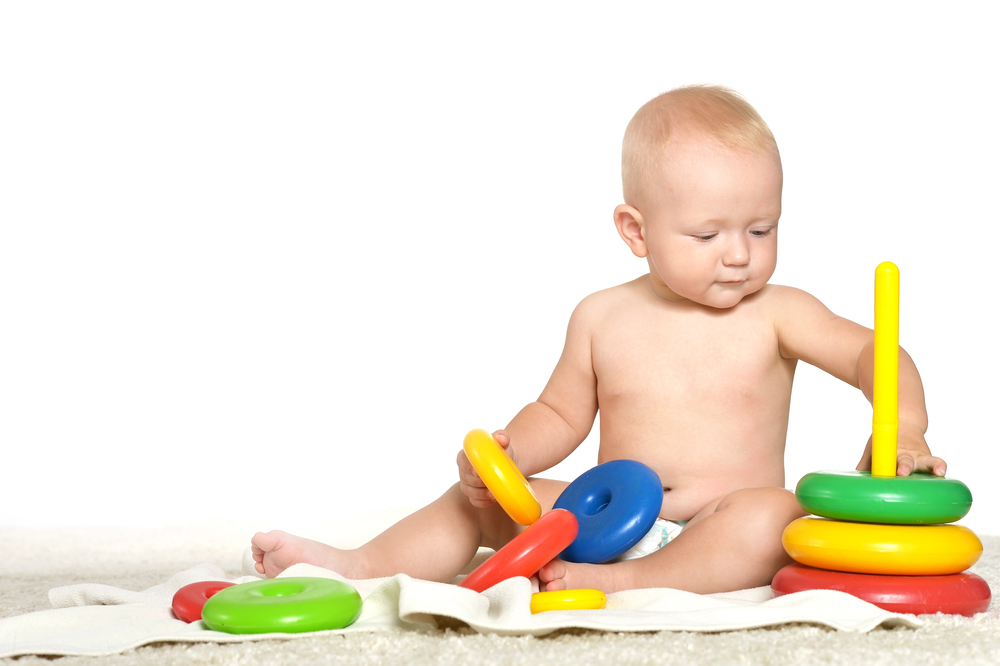
Toddlers: Ages 1 to 3 Years
- Learning Activities:
Reading age-appropriate books about colours, animals, counting, and letters helps toddlers begin building foundational knowledge and language skills. For example, try reading a book about animals and ask questions like, “What sound does the cow make?” This promotes word association and cognitive development. - Communication Skills:
Engage in simple daily conversations, even if it’s just talking about the day’s events. Encouraging storytelling helps toddlers develop verbal skills and an understanding of narrative structure. For example, asking your toddler about their favorite part of the day or the story they just heard encourages early communication. - Social-Emotional Skills:
Introduce brief daycare interactions to help your toddler develop essential social skills and emotional awareness. Role-playing with dolls or action figures about feelings (like sharing or saying “sorry”) can nurture empathy and emotional regulation. - Fine Motor Skills:
Teaching your toddler how to wash hands and manipulate small objects like building blocks, art supplies, or simple puzzles helps strengthen fine motor skills. You can encourage them by saying, “Let’s build a tower together” with blocks or “Can you put the lid back on the marker?” to engage them. - Multisensory:
Fill a sensory bin with materials like scrap fabric, toys, or even textured items like rice or beans. These activities develop tactile awareness and help toddlers build sensory integration. Singing familiar songs or introducing new foods helps them hone their hearing and taste, stimulating multiple senses at once. - STEAM Activity:
Introduce basic STEM concepts through activities like stacking shapes or sorting colored blocks into categories. This helps toddlers understand the basics of engineering (shapes and structure) and math (sorting and categorizing). - Sleep Coaching:
Maintain a consistent bedtime routine to promote good sleep habits. Let your toddler help with getting ready for bed by brushing their teeth or putting on pajamas. This fosters independence and helps them wind down emotionally. - Entertainment:
Engage in fun activities like storytime and pretend play, such as pretend cooking or playdough sessions. These activities promote creativity while also helping toddlers learn about real-world concepts like cooking or shape-making. - Games:
Create a homemade bowling alley using soft items for pins and a ball to stimulate learning while having fun. Playing counting, color, or letter games, such as “I Spy,” is also a great way to introduce new concepts in a playful manner. - Indoor Activities:
Simple arts and crafts like finger-painting or making cloud dough help develop creativity and sensory exploration. These activities also build motor skills and focus. - Outdoor Activities:
Ensure regular outdoor play, whether in the backyard or at a park, to develop motor skills, coordination, and give your toddler fresh air and sunshine. Activities like running, jumping, or even simple games like tag can help improve balance and physical strength.
Preschoolers: Ages 3 to 5 Years
- Learning Activities:
Teaching your preschooler to count, recognise colours, and practice writing can help them develop a sense of early academic success. For example, use large lined paper for tracing letters and numbers to build fine motor skills and letter recognition. - STEAM Activity:
Encourage building simple structures using blocks or household items to introduce early engineering concepts. You can also try simple science experiments, like growing a plant or mixing colors in water, to introduce them to scientific thinking. - Academic Skills:
Spend time working on counting, drawing, and writing skills, boosting your preschooler’s confidence for school. Make it interactive—try counting toys, drawing pictures of favorite animals, or practicing letters with fun writing games to build excitement for learning. - Communication Skills:
Keep the conversation flowing by asking open-ended questions that encourage responses, like, “What would you do if you were a superhero?” Creative storytelling encourages language development, helping them organize their thoughts and build vocabulary. - Social-Emotional Skills:
Discuss emotions with your preschooler and help them learn to identify their feelings. Simple exercises like feeling charades (where they act out emotions) can help them better understand their emotions and the concept of empathy. Regular playdates with peers also support social skill-building. - Fine Motor Skills:
Practice stacking blocks, tracing shapes, and using art supplies to help develop fine motor coordination. Doing activities like these fosters their ability to control hand movements and interact with objects in a precise manner. - Multisensory:
Play with musical instruments like a keyboard to explore sound, rhythm, and coordination. Using tactile sensory toys like textured balls or clay helps them strengthen their sense of touch and engagement with materials in a creative way. - Sleep Coaching:
Keep a consistent bedtime schedule and teach your preschooler the importance of quiet time when they no longer nap. You can make bedtime fun with a soothing routine, like a relaxing bath and reading a bedtime story, which encourages healthy sleep habits. - Entertainment:
Sing-alongs, storybooks, and limiting TV time to a healthy balance all promote cognitive and language skills. Sing a favorite song or introduce new ones that involve actions and body movements, enhancing coordination and memory. - Games:
Simple games like ring toss, musical chairs, or educational board games like “Connect Four” or “Candy Land” teach basic rules, social interaction, and skills like turn-taking and following instructions. - Indoor Activities:
Engage in fun arts and crafts like creating birdhouses, noodle necklaces, or nature-themed art projects. These activities foster creativity, motor skills, and focus. - Outdoor Activities:
Encourage nature exploration by planting a garden and teaching them how to care for it. Activities like these promote a sense of responsibility and connection to the natural world, while fostering physical and emotional development.
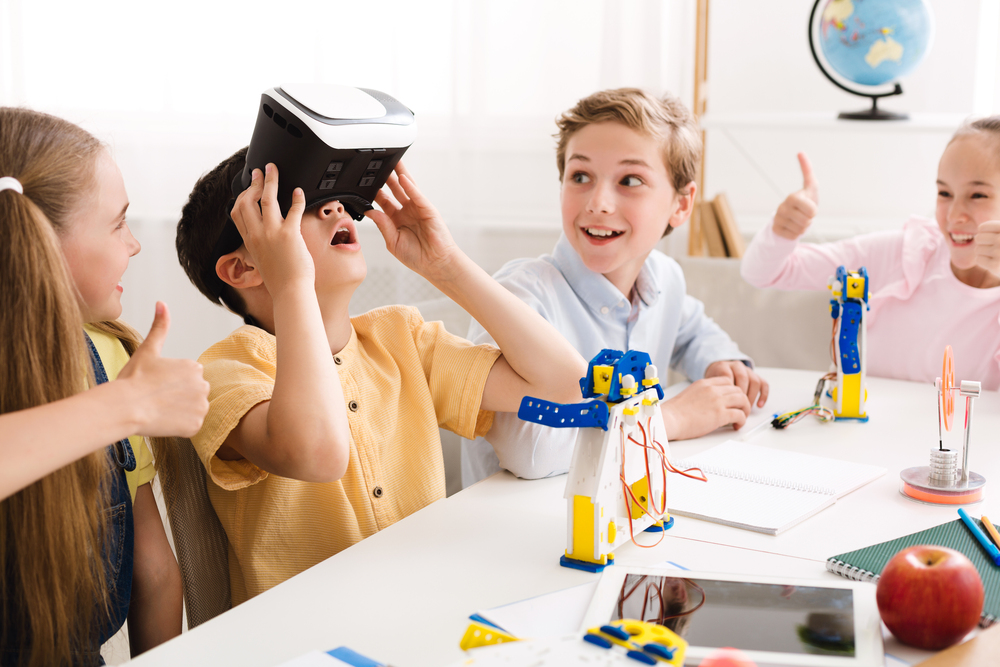
Primary-Schoolers: Ages 5 to 9 Years
- Learning Activities:
Promote critical thinking by creating scenarios that require solutions, such as asking questions like, “How could we build a bridge to cross this gap?” STEM activities like simple experiments (e.g., making a volcano or building a paper airplane) deepen their intellectual curiosity and learning. - STEAM Activity:
Build a simple machine using household materials to introduce basic engineering concepts. You can also make a DIY lava lamp using water, oil, and food colouring to teach them about chemical reactions in a fun, hands-on way. - Academic Skills:
Help with homework, making it a fun and positive experience. Use rewards for completion, such as a special activity or extra screen time, to make learning enjoyable. Turn homework into a challenge by setting a timer for speed or adding fun educational apps to their routine. - Communication Skills:
Encourage your child to write stories or express their thoughts aloud. These activities help with sentence structure, vocabulary building, and storytelling skills. Conversations about their day also foster openness and trust. - Social-Emotional Skills:
Enroll your child in extracurricular activities like soccer, music lessons, or dance classes to foster better socialisation and emotional development. Encourage them to openly discuss their feelings, which promotes emotional intelligence and understanding. - Multisensory:
Use sensory tools like wall charts, dry erase boards, or modeling clay to enhance learning. These activities not only promote academic engagement but also strengthen sensory processing through hands-on involvement. - Fine Motor Skills:
Encourage tasks like using eating utensils properly, opening doors, or completing other tasks independently. Cutting, sculpting, or building activities help them refine their dexterity and motor coordination. - Reinforce Old Skills:
Continuously practice basic skills like counting, reading, and writing to build on prior knowledge. Educational games and exercises like flashcards or writing exercises can help solidify these skills. - Entertainment:
Find activities your child loves, such as painting, crafting, or playing musical instruments. These hobbies keep them entertained and engaged while fostering creativity and motor skills. - Games:
Choose educational games like chess, Scrabble, or other strategy games to build problem-solving, logic, and communication skills. DIY games can encourage teamwork and creativity. - Indoor Activities:
Let your child express creativity with arts, crafts, and dress-up activities. Create a space for self-expression by encouraging them to make their own artwork or write their own stories. - Outdoor Activities:
Regular park visits, biking, and playdates with friends encourage physical activity, social interaction, and motor development. Activities like soccer or swimming develop both strength and social skills.
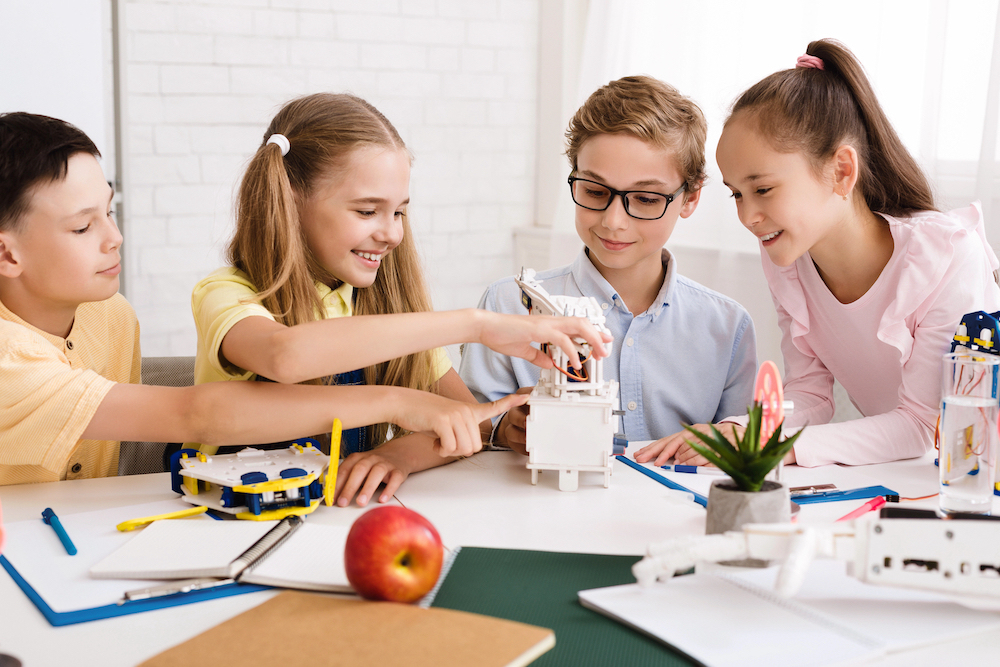
Tweens: Ages 9 to 12 Years
- Learning Activities:
Teach life skills such as managing money, balancing a checkbook, and doing household chores. These practical activities build independence and responsibility, which are crucial for preparing them for adult life. - STEAM Activity:
Encourage them to take part in a DIY science project like building a robot or creating a working model of the solar system to apply math, engineering, and technology. These projects foster problem-solving and creativity in a practical setting. - Academic Skills:
Encourage independent study habits by creating a summer reading list or setting up a quiet space for study. This helps teens stay academically engaged and strengthens focus and organizational skills. - Communication Skills:
Build trust by encouraging your teen to communicate openly. Ask casual questions to promote dialogue and express an interest in their lives, while respecting their boundaries. - Social-Emotional Skills:
Encourage empathy, active listening, and self-awareness. Help them express their emotions openly through activities like journaling or discussing situations that challenge their emotions. - Fine Motor Skills:
Encourage physical activities like sports, dance, and music to develop coordination. Even video games can aid in fine motor skills but should be balanced with other physical activities. - Reinforce Old Skills:
Keep reinforcing skills like reading, writing, or playing an instrument. These activities ensure that teens continue practicing skills they’ve developed, strengthening their foundation for future challenges. - Entertainment:
Allow for independent exploration of hobbies like music, coding, or writing. Support creative pursuits by helping them access tools like art supplies or software for projects they enjoy. - Games:
Board games and online games that encourage teamwork, strategy, and logic are excellent ways for teens to practice skills while having fun. - Outdoor Activities:
Encourage teens to join a sports team or club, or set up regular weekend activities to stay active and social. Hiking, camping, and team sports like football or basketball help build both physical and social skills.
From infancy through the teen years, engaging your child in various activities at every stage of development will enhance their growth. These activities support cognitive, emotional, and physical skills that will benefit them both now and in the future, contributing to their well-roundedness and success as adults.


